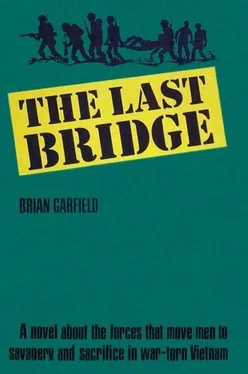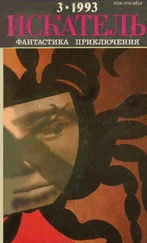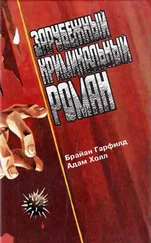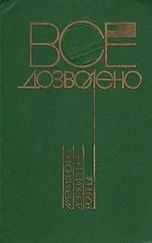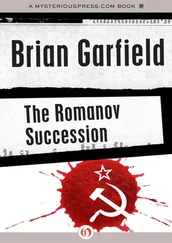Sirens advanced not far away. Smith ran along behind Hooker, leaping tangled vines. They plunged through the back of the garden and ran down a little dirt path, still puddled with mud. Wind plunged in and out of Smith’s chest. They reached the head of a little street.
The hill blocked sight of the fire, but the clouds were red. The glow glistened on the moist cobblestones. Smith dropped to his knees and could not stand up. He could not make his voice cry out.
Half a block ahead, Hooker looked back over his shoulder. “What the hell’s wrong with you?”
Smith could not shake his head. He stared open-mouthed at Hooker. Hooker’s face went out of focus. Smith dropped his gun, and Hooker, a vague drifting outline, ran back to him through a clinging mist. Hooker’s big meaty hand came out of it and smote Smith across the face like the flat of an ax against a side of beef. The slap tilted Smith’s precious equilibrium — he fell against the soft mattress of the street. He saw the round toes of Hooker’s combat boots, sideways to the plane of his vision.
He saw the remains of the dead rat in the corner of the room. It scuttled forward; its eyes glowed. He could feel the rat’s hot breath.
Hooker slung his machine gun across his back and reached down to pick up the Corporal, but Smith pulled away, got on his feet, and ran off like a cyclone, shrieking. Hooker went after him, cursing. Smith ran up the street, zigzagging at amazing speed until he bounced off a wall and reeled for a bit. At the head of the street, a group of men appeared from the pagoda gardens. Hooker stopped and settled down coolly on one knee to shoot. Smith weaved back and forth across the field of fire. He ran right up to the top of the street, and the soldiers shot him down.
It was while Smith was still falling that Hooker swept the hill with his gun. The soldiers fell back into the garden, taking cover. One of them crawled, dragging a limp leg. Hooker dived for the nearest building and slid along the wall, sprinkling the head of the street at intervals with bullets. He got away into an alley and heard the rattling steel of an armored car advancing up the hill. Hooker cursed. “Stupid Goddamn idiot,” he said. “Jesus H. Christ.” He went down into the city with a disgusted expression. A dozen blocks below the hill, he stopped at an intersection in the protection of a deep doorway.
A jeep went by at high speed. Hooker flattened himself back into the door. The jeep was overloaded with troops. It went up the hill, and Hooker said, “Too late, guys.” He laughed.
The staff car came out of a side street and stopped in the intersection; he heard the engine gun three times. He stepped out of cover and walked over to the car. Sergeant Khang held the door open. Colonel Tyreen said, “Where’s Smith?”
“He didn’t make it,” Hooker said. He got in, and Tyreen drove up the street. “He cracked up. Went crazy. I couldn’t stop him. The damn fool bastard ran right up the hill, and they shot him all to pieces.”
Tyreen said, “He saw it coming a while ago.”
In the back seat Saville said, “Anyhow, nobody can hurt him now.” He had someone across his lap, wrapped in a raincoat. Hooker could not make out the man’s face.
Tyreen drove into a wagon barn and turned off the ignition. He threw the keys into a pile of straw. “We walk from here. They’ll have half the battalion looking for this car as soon as they get that fire under control.”
Hooker said, “That was a damn pretty fire, Colonel.”
Saville hoisted the unconscious man in his arms. Sergeant Khang went to the door to scout the street. Saville said, “What now?”
“It’s a few blocks to the garage. We’ll get back to the truck.” Tyreen wiped his mouth raggedly. “Breaking him out was the easy part. Getting away — that’s the rough patch.”
Chapter Thirty-five
1245 Hours
Strange air pressures built up in the clouded skies; at this particular instant McKuen’s altimeter read twelve thousand feet. “Ridiculous,” McKuen said. “Mister, we have been banging around up here for more than an hour, and I’d just like you to be knowin’ that we have twelve minutes’ fuel in the tanks and I dinna ken where the bloody hell we are, if you’ll be kind enough to pardon me Scottish. We should have been over the briny Goddamn deep twenty minutes ago, if the compass is anywhere near right. But we just passed a bloody mountain peak. Either we have been fighting a forty-mile-an-hour head wind or we are flying at ninety-five miles an hour, which perhaps you know is quite improbable, not to say bloody impossible.”
After a moment’s droning silence, McKuen said, “Of course, being dead, Mister Shannon cannot well be expected to reply. Mister, you are Goddamn bloody well lucky.”
He had been talking steadily for a quarter of an hour.
“To hell with it,” he said. “By your leave, Mister, we’ll be going down for a look.”
The gooney bird vibrated intensely; the panel bottomed on its rubber mountings. McKuen pushed the control yoke forward. He set his teeth. His lips were insensitive; his hands were chilled to unfeeling. The artificial horizon indicator had rolled over on its back and expired. The head temperatures of both engines continued to climb; and another backfire might stall them. According to the altimeter, updrafts and downdrafts were plunging the plane up and down at the rate of several thousand feet a second. McKuen snorted. Even the seat of his pants gave him no help; he might have been upside-down. Looking through the bullet-cracked windows did no good — a solid gray mat of cloud pressed against the glass like an enormous nose. McKuen’s face lengthened dismally. He fumbled for a cigarette and lighted it, and smoke idled around the cockpit, fogging about his head, caught there in crosscurrents. The dead springs of the seat jarred his buttocks. A loose piece of wire hung from overhead, swinging crazily. The wing temps had warmed up, but now and then a loose chunk of ice broke off and banged against the plane. Crazy spasms ran through all his muscles. Beads of water scraped along the glass — and at least that was better than frost. He crushed out the cigarette in the rusty ashtray; he had hardly taken two drags. Through the window he could only make out the vague dark outline of the wing, the ghostly red exhaust of number two. The altimeter settled at sixty-eight hundred feet.
“Where’s the bottom of this puking-ass cloud?” He was sure to fly into a mountain. Back in the fuselage a loose bolt complained with an insistent rattle. “It will be kicks, Mister, to fly around up here until we run out of bloody petrol. Six or seven minutes, Mister. That’s all. McKuen, you smoke too Goddamn much. It will take two years off your life.”
He straightened out the crumpled cigarette and lighted it again. “I feel like the cheese in a sandwich.” After a moment he said, “Pretty soon somebody’s teeth will bite into it, what?”
The temp gauge went down to thirty-two, but that was not yet quite cold enough to ice up the wings again. He throttled back, seeking an added few seconds of fuel. There wasn’t much choice left. He checked his parachute harness.
“Like jumping onto a yogi’s bed of nails,” he said. “Mister, I’ll tell you one thing straight. If I get out of this, I will spend the rest of my life at sea level on my belly. I will never so much as go up in an elevator. What’s that, Mister? What do you mean, don’t I like to fly?”
He said more quietly, “I like flying the way an alcoholic likes whisky, Mister. That’s how I like flying.”
He pushed the yoke forward and tipped the plane down. His mouth became a longer and thinner line. “Mister, there has got to be a break in this stuff.” He banked around. The plane rattled, and number two began to choke and cough. He reached for the mixture controls, but by the time he moved them, number two had packed up. It feathered for a moment and stopped.
Читать дальше
